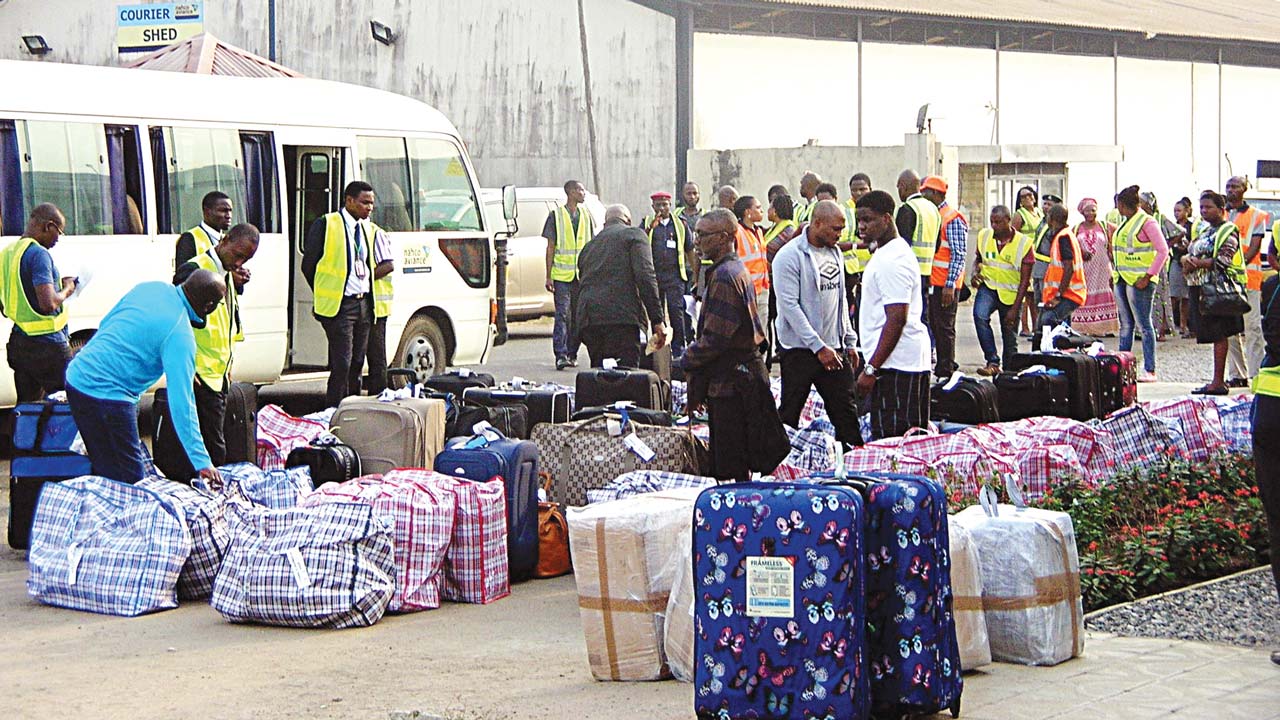- FG Evacuates 481 Trafficked Nigerians From Libya
A set of 481 Nigerians evacuated from Libya arrived at the Port Harcourt International Airport in Rivers State on Sunday with sad stories.
While some of the returnees (females) were pregnant and looked tired, a large number of them, especially the young men, appeared emaciated ostensibly due to the lack of adequate food inside their detention camp in the North African country.
This is just as the Federal Government promised to rehabilitate the returnees, who flew in with a chartered Max Airline at exactly 4.55pm.
One of the returnees, who spoke with newsmen, 42-year-old Lucky Iyanusa from Edo State, said he went through hell after he was arrested by the Libyan police.
Iyanusa explained that many Nigerians were killed by Libyan security agents for no reason, adding that the entire N850,000 he spent in order to get to Europe through the North African country had gone down the drain.
The returnee, who was an artisan before he left Nigeria, recalled that he had to sell all his tools before he could embark on the journey to Libya from Kano State through the desert.
“I travelled to Libya on June 9, 2017. My aim was to travel to Europe and the only way I could achieve that was to get to Libya first. The financial condition with me and my family in Nigeria was bad and I had to sell all my work tools to travel to Libya by road.
“I moved to Libya from Kano State and through the desert. I could not get to Europe because I was arrested by the Seaside (Marine Police in Libya). The day I was arrested, 290 blacks were killed by the Libyan policemen; that was in November, 2017. Nigerians, Ghanaians and Malians were killed. Some had their legs shot and amputated.
“We were arrested and kept in an underground cell since last month. Inside the prison, we met some of our Nigerian brothers, who had been there for up to three years, four years, six months, nine months. Nigerians are going through hell in that place. We were fed once a day with something that looked like the bottom of a water bottle.
“People have been travelling through the desert; I am not the first person. We have burgers we pay to enhance our move. I paid N850,000 to a burger for me to travel to Libya and to Europe. I was washing cars to feed when I got there,” Iyanusa, who was in tears, added.
Addressing the returnees, who were served rice immediately they were ushered into the Hajj camp near the airport, the Minister of Foreign Affairs, Geoffrey Onyeama, explained that apart from rehabilitating them, government would ensure they (returnees) were gainfully employed.
“We saw the inhuman condition you went through; we saw the traumatic condition. Despite the inhuman conditions you were subjected to, you comported yourselves in a very responsible manner.
“We know that many of you were trafficked. We will make provisions to rehabilitate you to enable you to get good jobs. You have exhibited self-control. We will not abandon you.
“We will do everything possible to rehabilitate you. We want you to become advocate of the youths. We want you to go out there to share your experiences with the youths out there on what you encountered as to discourage them from embarking on such trip.”
The minister commended the Rivers State Government and other Federal Government agencies for the role they played in bringing back the returnees.
In his remark, the Rivers State Governor, Nyesom Wike, said the state was in support of the Federal Government’s efforts to bring Nigerians back from Libya.
Wike, who was represented by the Secretary to the Rivers State Government, Mr. Kenneth Kobani, stated that there was a common concern when it the issues concern Nigerians irrespective of tribe or state.
Among Federal Government delegation to Libya are the Director General of the National Emergency Management Agency, Mustapha Maihaja, Senior Special Adviser to the President on Diaspora, Mrs. Abike Dabiri Erewa.
Maihaja said, “In line with the mandate from President Muhammadu Buhari, we have started repatriating Nigerians who are trapped in Libya. We are using Max Air and Medview Airlines with a target of completing the process in three weeks.
“The first batch in the inaugural flight included 481 returnees. We have put necessary logistics in place for a hitch-free evacuation.
“The returnees will undergo profiling, medical examination and other processes before reuniting them with their families.
“We are collaborating with relevant state governments to receive these returnees at the Reception Centre.”


 Naira4 weeks ago
Naira4 weeks ago
 Naira3 weeks ago
Naira3 weeks ago


 Naira4 weeks ago
Naira4 weeks ago




 Naira3 weeks ago
Naira3 weeks ago
 Commodities4 weeks ago
Commodities4 weeks ago


 Sport Business4 weeks ago
Sport Business4 weeks ago


 News3 weeks ago
News3 weeks ago


 Banking Sector4 weeks ago
Banking Sector4 weeks ago























